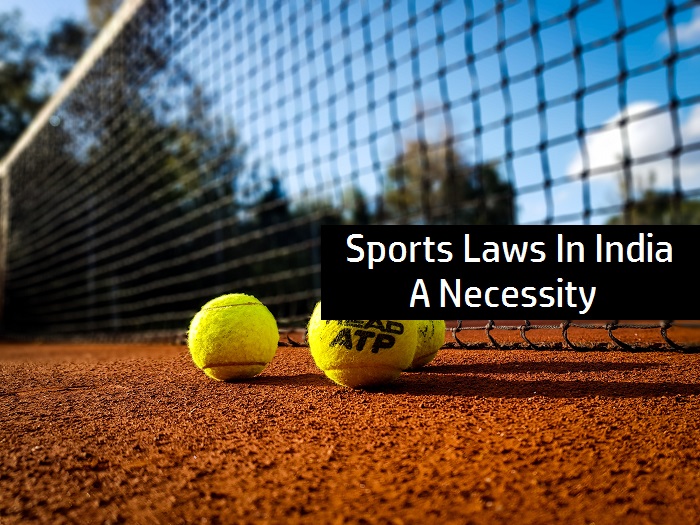Sports Laws In India: A Necessity
Sports law is the dynamic interplay of more than one law which includes contract law, tort law, labour law, tax law, intellectual property law, media law etc. Sports Laws In India: A Necessity Gone are the days when people used to say “padhoge likhoge banoge nawab, kheloge kudoge hoge kharab” which means that if you study then you… Read More »

Sports law is the dynamic interplay of more than one law which includes contract law, tort law, labour law, tax law, intellectual property law, media law etc.
Sports Laws In India: A Necessity
Gone are the days when people used to say “padhoge likhoge banoge nawab, kheloge kudoge hoge kharab” which means that if you study then you will become a successful person and if you play then you become bad. Today’s era is the era of sports. Sports have become a major part of today’s society and its demand is increasing day by day.
Sports law may be expounded as whatever sports industries intersect law. A law is not complete in itself and is regulated by other laws as well. Similarly, sports law is the dynamic interplay of more than one law which includes contract law, tort law, labour law, tax law, intellectual property law, media law etc. But there are various reasons to feel shameful as there is no concrete sports law in India.
Constitutionality
Sports’ is a subject which comes under the State list in terms of Entry 33 of List II of the Seventh Schedule of the Constitution of India. To ensure efficient performance by players, management and spectators there is a requirement of the legislation.
There is various legislation considering sports in India. The legislations are present at international as well as at the national level. The fundamental aspect of sports law is to ensure players rights which includes right to participation, right to payment, etc.
Arbitration Clause
At the international level, the Court of Arbitration for Sports (CASP) ensures such right. Primarily arbitration is Alternate Dispute Resolution so it is an alternative to going to a court. CASP may be understood as a Supreme Court but at the international level. Basically, a player no matter from which country things that his rights are violated or sports body of his country doesn’t recognize his rights then he can approach CASP.
It is the universal rule that if any national body makes contact with any of the players then under such agreement there should be an arbitration clause so that such player can approach CASP. CASP is subjected to The Arbitration and Conciliation Act, 1996 and the enforcement of the order of CASP will have the same effect as an ordinary court of India has.
Governance
There are various bodies of governance, International Olympic Association is such body of governance at the International level and under the national level, there is the Indian Olympic Association. At the Ministry level, Ministry of Youth Affairs and Sports keeps the information about the sports-related news and ensures encouragement. Sports Authority of India and National Sports Federation, reports to Ministry of Youth.
Sports Authority work incorporates basic requirements with respect to sports which includes infrastructure and sports equipment and National Sports Federation fundamental aim is to bring best to best players and them to national as well as international level and functions as to encourage each federation, be it All India Football Federation, Basketball Federation of India and fulfil their requirements.
Can the Right to Participate in a Sports event be Curtailed?
Rights of players under some circumstances can be curtailed and such circumstances include the player’s having a positive result in doping. Such a doping test is conducted by the National Anti Doping Agency (NADA).
Can one claim report of such banned player? Before 2010 there were many contentions regarding this topic but latter the judgment of Indian Olympic Association v. Veeresh Malik, [WP (C)No.876/2007] made it clear that IOC and other sports body are public bodies and a person can claim the right to information under Section 2(j) of Right to Information Act, 2005.
There are various policies concerning sports as well but again it is not an independent body. National Sports Policy, 2001 with the objective to promote excellence in sports and development of sports and there is National Sports Development Bill, 2011, the fundamental aspect of this bill is to bring all sports federation under Right to Information Act. And if a body comes under the ambit of state, then the transparency should be maintained.
Conclusion – Sports Laws In India: A Necessity
There are various bodies in our country but a strong and comprehensive body of sports administration does not exist. There should be one strong policy which can promote sports and can cover all related issue of the sports-related to employment, broadcasting and advertisement rights, harassment, liabilities, lack of fund and poor infrastructure policy.
We the people should ensure better implementation of further acts by promoting better government. And such policies may undertake all the governance and legislation under its ambit.
By – Ashutosh Rajput
The author is a law student at Hidayatullah National Law University, Raipur.

